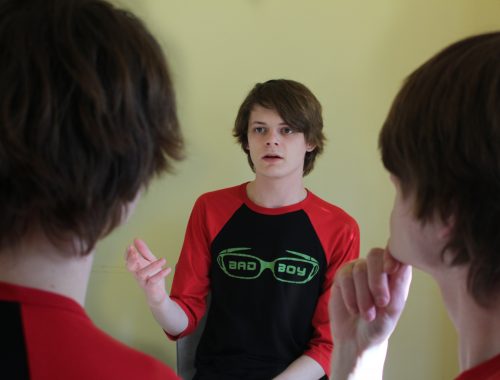Flashcards…The Key to Success?
Job interviews: a near graduate’s biggest fear (that near graduate being me). We all have an image in our minds of what an interview looks like- don’t we? For me, it’s an early morning start (9am to be exact), handshakes, eye contact (but not for too long), big smiles (but not too big), and being prepared for EVERY possible question (but don’t forget to get enough sleep).
Job interview anxiety has affected 93% of candidates at some point in their career, according to Andrew Fennell [1]. So, what I wasn’t prepared for was the supportive and positive atmosphere that my interviewers (a.k.a. my classmates) and Jane created for me. The process taught me much about myself and, to find out what lessons I learnt along the way, keep reading as I discuss my experience below using Gibb’s Reflective cycle.
[2]
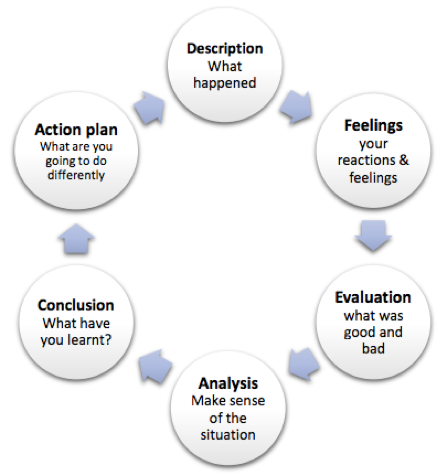
Describing the experience:
The interview:
My team consisted of me and three other girls, and we each had a ten-minute allocated slot for our interviews, as is illustrated in the infographic below.
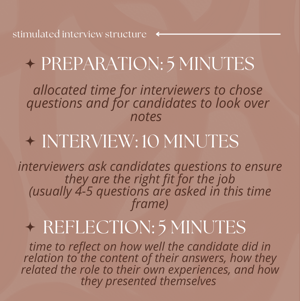
I prepared rigorously to ensure the day would run as smoothly as it possibly could. As you can imagine, I have experienced my fair share of disastrous interviews so thankfully, I didn’t have to add this one to the list! It went surprisingly well, and I was pleased with the outcome!
A Week Before: The Preparation
Thanks to Emma Lennox’s insightful lecture, I knew what I had to do to successfully prepare. She made me aware of the importance of choosing a job description that suited my skill set, my experiences, and my values. A couple of days prior to this, I had found out the life-changing (and entirely terrifying) news that I had received an offer to study an English Secondary PGCE at Cambridge, which gave me a newfound confidence in my teaching potential. It also influenced the job description I interviewed for, which was a graduate teaching position in The Netherhall School in Cambridgeshire. The job seemed like the perfect fit for future, PGCE-graduate-me. It detailed (emphasis on detailed) the expectations the school had for the candidates. I knew from my interview for Cambridge that I not only needed to be aware of these expectations but also how to effectively communicate how I met them. This is where my flashcards came into the equation.
My flashcards:

My Feelings:
If you know me, you know I love a flashcard. The not-knowing aspect of interviews (who is interviewing, what they are going to ask) is what frightened me the most, and the only way I know to ease this fear is to be prepared for every situation and question. Hence my love of the humble flashcard. Jeffrey D. Karpicke notes that flashcards are a method of “repeated retrieval practice” which enhances “long-term retention” [3]. So, in using this technique, I was able to walk into the building with a semi-sense of confidence, which was further established by the kind and welcoming nature of my interviewers.
Evaluating:
Upon reflection, I am pleased with how the experience unfolded. Preparing so rigorously allowed me time to plan and structure my answers according to the STAR technique, which I came to understand the importance of through QUB career’s page. This method prompts a story-like yet systematic response to answers and, according to TES, “example-rich answers” [4] are exactly what interviewers are looking for. This is especially the case if they, for instance, ask a competency-style question such as: ‘Tell me about a time you had to deal with conflict in the classroom. How did you handle it?’. In answering this question, my interviewers reported that I was able to effectively communicate the skills I have developed through my placement at Castlederg High School. Utilising the STAR technique enabled me to passionately illustrate how I was the ideal candidate for the role.
Some examples of feedback from peers:



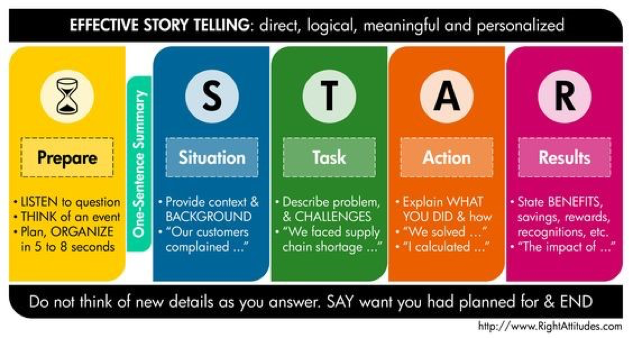
I was also able to express my motivation and passion through my subject-specific knowledge. Sarah Wright notes that “newly qualified teachers” must be “confident and authoritative in the subject that they teach” [5] and so, in appreciating this, I made revising my degree-specific knowledge a non-negotiable in my preparation. This allowed me to demonstrate professionalism and also my drive for their specific vacancy. However, despite harbouring this inner confidence within myself, I do not believe this was outwardly communicated as much as I would have liked.
Analysing:
I knew throughout the entire process that the majority of my success would stem from the preparation I had completed prior. In analysing my preparation, I have realised the importance of being as specific as possible in relation to the experiences I chose to share with the interviewers. I have learnt that tailoring my experiences to what the interviewers are asking for allows me to fully imagine myself as part of their team. This visualisation also provides me with the assurance that I am suitable for the role. I understand now that I need to learn how to better express my confidence and enthusiasm by working on the volume of my voice. Gabriel Angelo notes that communication is “one of the building blocks of our society” [6] and I have now come to realise this in reflecting upon my interview experience. After spending so much time scaffolding an internal sense of confidence in my own abilities, I now aim to emulate this in how I outwardly present myself to others.
Concluding Thoughts:
Moving forward, I hope to become more expressive, more open and more able to outwardly display my enthusiasm for education and teaching. If I were to repeat the experience again, I would speak louder, with more conviction. I have also recently read an article that quotes Cristian Rennella who states “For an employer, not having a good question is equivalent to not being interested”, [7]. I am consequently making it a goal to ask at least one meaningful and compelling question at the end of my next interview.
References:
[1] Fennell, Andrew. “Job interview statistics: The latest and most important job interview stats in 2022.” Job Description Library. 2022, Available at: https://jobdescription-library.com/job-interview-statistics#interview-nerves (Accessed: 10th February 2022).
[2] University of Cumbria Academic Services & Retention Team. Gibbs’ reflective cycle. 2016, Available at: https://my.cumbria.ac.uk/media/MyCumbria/Documents/ReflectiveCycleGibbs.pdf (Accessed: 11th February 2022).
[3] Karpicke, Jeffrey D. “The Critical Importance of Retrieval for Learning.” Science, vol. 319, no. 5865, American Association for the Advancement of Science, 2008, pp. 966–68, Available at: http://www.jstor.org/stable/20053384 (Accessed 4th February 2022).
[4] TES Editorial. “How to make your interview a success.” Tes. 2021, Available at: https://www.tes.com/en-au/jobs/careers-advice/application-and-interview/how-make-your-interview-success (Accessed 11th February 2022).
[5] Wright, Sarah. “5 ways to ensure you develop a unique teacher identity.” Tes. 2019, Available at: https://www.tes.com/new-teachers/classroom/5-ways-ensure-you-develop-unique-teacher-identity (Accessed: 12th February 2022).
[6] Angelo, Gabriel. The 7 Effective Communication Skills: How to Be a Better Communicator Now. N.p., CreateSpace Independent Publishing Platform, 2014.
[7] Moore, Emily. “Interviews: The Dos and Don’ts of Showing Passion in an Interview.” Glassdoor. 2018, Available at: https://www.glassdoor.com/blog/showing-passion-in-an-interview/ (Accessed 13th February 2022).
Bibliography:
- Angelo, Gabriel. The 7 Effective Communication Skills: How to Be a Better Communicator Now. CreateSpace Independent Publishing Platform, 2014.
- Carnegie, Dale. How to Win Friends and Influence People. India, Srishti Publishers, 2020.
- Fennell, Andrew. “Job interview statistics: The latest and most important job interview stats in 2022.” Job Description Library. 2022, Available at: https://jobdescription-library.com/job-interview-statistics#interview-nerves (Accessed: 10th February 2022).
- Karpicke, Jeffrey D. “The Critical Importance of Retrieval for Learning.” Science, vol. 319, no. 5865, American Association for the Advancement of Science, 2008, pp. 966–68, Available at: http://www.jstor.org/stable/20053384 (Accessed 4th February 2022).
- Moore, Emily. “Interviews: The Dos and Don’ts of Showing Passion in an Interview.” Glassdoor. 2018, Available at: https://www.glassdoor.com/blog/showing-passion-in-an-interview/ (Accessed 13th February 2022).
- TES Editorial. How to make your interview a success. Tes. 2021, Available at: https://www.tes.com/en-au/jobs/careers-advice/application-and-interview/how-make-your-interview-success (Accessed 11th February 2022).
- Wright, Sarah. “5 ways to ensure you develop a unique teacher identity.” Tes. 2019, Available at: https://www.tes.com/new-teachers/classroom/5-ways-ensure-you-develop-unique-teacher-identity (Accessed: 12th February 2022).
Interviewing for a Clean Break
You May Also Like
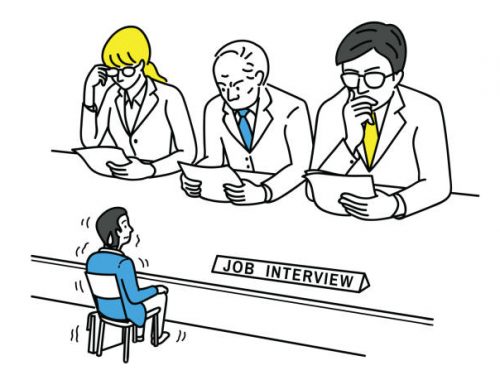
Simulated Interrogation
18 February 2022
Finding the Right Balance: My Simulated Interview Experience
14 February 2022